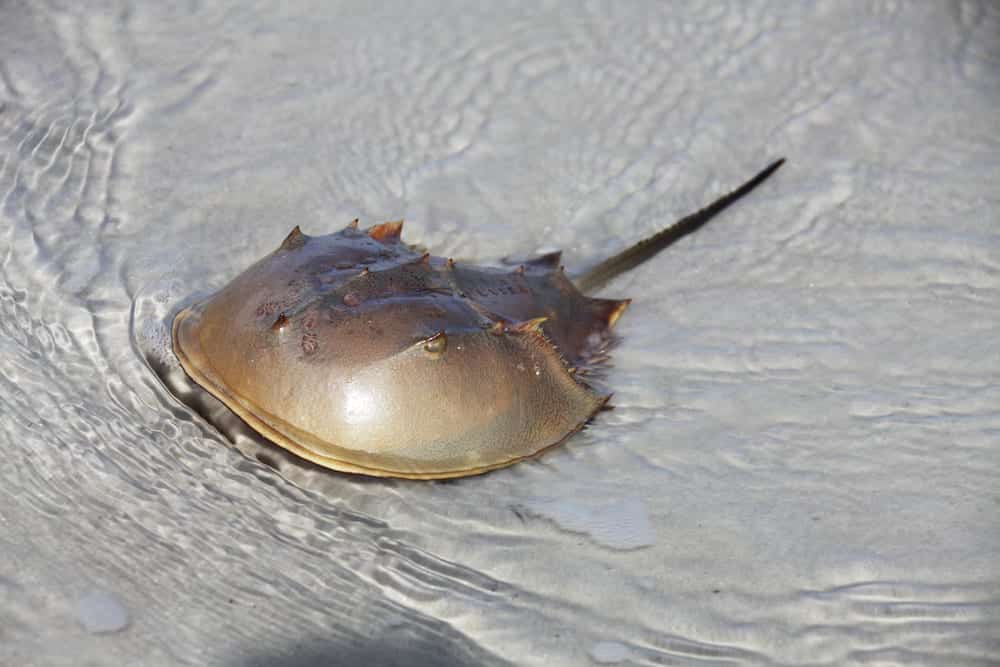How can these ancient arthropods play a vital role in ending a global pandemic?
The Atlantic horseshoe crab, or Limulus polyphemus, is one of the oldest living things on the planet. Known as a “living fossil,” the horseshoe crab predates dinosaurs by 200 million years — and has remained largely unchanged for the last 450 million years. These ocean dwellers, which inhabit the Atlantic coast from Maine to Florida, are more closely related to scorpions than to true crabs.
So what do horseshoe crabs have to do with the SARS-CoV-2, or the novel coronavirus? Their blue, copper-based blood contains a substance called limulus amebocyte lysate (LAL), which clots in the presence of bacterial toxins. The horseshoe crab’s armored body and the LAL in its blood has protected it from mass extinctions and predation for hundreds of millions of years. And now, it will have a crucial role in the fight against SARS-CoV-2, the virus that causes COVID-19.

Endotoxins and LAL
As it turns out, many of us owe our lives to horseshoe crabs. During the manufacturing process, vaccines can be contaminated by endotoxins, which are molecules in the cell walls of many common bacteria. Endotoxins can cause fever and death in humans, even if the bacteria that originally produced them have been killed off. To avoid these side effects, pharmaceutical companies are obligated to perform bacterial endotoxin testing — using LAL from horseshoe crabs — at each stage of the manufacturing process. Because LAL clots in the presence of endotoxins, it can be used to detect those endotoxins in everything from reagent water to intravenous drugs.
Horseshoe Crab Bleeding
A handful of companies in the U.S. harvest horseshoe crab LAL and sell it to the pharmaceutical industry. Horseshoe crabs are caught, transported to a harvesting facility and have up to 30 percent of their blood removed. The technicians who bleed the crabs use only a small portion of it that is stored in the sinus sack surrounding the arthropod’s heart. Within 24 hours, the crabs are returned to the same waters from which they were caught.
The process of horseshoe crab bleeding does present conservation concerns. During a survey of the biomedical field’s LAL-harvesting activities in 2019, the Atlantic States Marine Fisheries Commission estimated a 15-percent mortality rate. Additionally, although the crabs are returned to the wild after the blood harvesting, there are some negative effects on the spawning process. After their blood is harvested, female crabs are unable or unlikely to make the arduous journey to the intertidal zone to spawn. Some endangered shorebird species feed exclusively on horseshoe crab eggs, and the crabs’ failure to spawn detrimentally affects those populations.
There is a synthetic alternative to LAL called recombinant Factor C (rFC). It eliminates the need for blood harvesting and can be used for testing materials used in the drug manufacturing process. But the industry standards group U.S. Pharmacopeia (USP) recently abandoned their plans to list rFC as an equal alternative to LAL, citing concerns over lack of testing. LAL has a strong 30-year track record, and rFC has only been studied for two years. LAL bacterial endotoxin testing remains the gold standard.
LAL Needs for Coronavirus Vaccines
The companies that harvest and sell LAL are unconcerned about demand surges for the clotting agent due to COVID-19 vaccine development. Very little LAL is needed to test a sample, and only one full day of production would be necessary to ensure the purity of up to five billion doses. But some conservationists are uncomfortable with dependence on the species. “It is crazy making that we are going to rely on a wild animal extract during a global pandemic,” said Ryan Phelan, the head of nonprofit Revive and Restore.
Regardless of whether the pharmaceutical industry uses LAL or rFC to ensure the safety of potential SARS-CoV-2 vaccines, one thing is clear: these ancient creatures are poised to play a pivotal part in the prevention of this novel disease.
Since 1995, QPS has provided discovery, preclinical, and clinical drug development services. QPS has CLIA-certified and GLP-compliant laboratories ready fast track your novel coronavirus and COVID-19 RT-qPCR/QPCR and Serological Assays and vaccine development programs. An award-winning leader focused on bioanalytics and clinical trials, QPS is known for proven quality standards, technical expertise, a flexible approach to research, client satisfaction and turnkey laboratories and facilities. For more information, visit www.qps.com or email [email protected].





